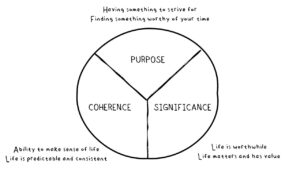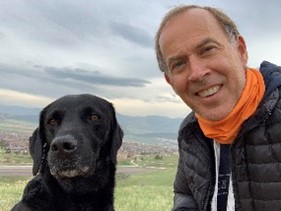Article Summary:
How are purpose and spirituality related? How about calling? Excerpts from my conversation on purpose and spirituality with best-selling author, Richard Leider, in the wake of the publication of the 4th edition of The Power of Purpose: To Grow and to Give for Life, with David Shapiro.*
+++
Gregg Vanourek:
Richard, I want to ask you about defining moments or phases of your life that have been purposeful. What’s your personal experience with purposeful living?
Richard Leider:
Well, I think we’ve all had fortuitous encounters with people in our life who have made a difference in some way, who have awakened us. In 1968, I spent a week with Viktor Frankl, the author of Man’s Search for Meaning. He was in three different Nazi concentration camps. He was a world-renowned thinker at the time with Sigmund Freud, Alfred Adler, and others. Frankl he was writing about logotherapy, about meaning and purpose in life—that we’re here for a reason.
In the concentration camp, he would get up in the morning and give others what I call a “small p” purpose action: a kind word, a hug, a crust of bread, hope for the future. Out of that came Man’s Search for Meaning.
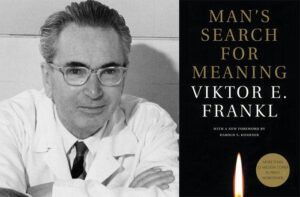
At that point, I was trained as a counseling psychologist, but I said, This message needs to go somewhere. I’m going to do what I can with it. It was a fortuitous encounter. I didn’t have any money, and I was the youngest person in the room. But I was there for a reason, I think. And here we are today.
So, think about your fortuitous encounters. You’ve had your own, I know, with your father, with others, who are wellsprings of wisdom we can learn from.
Gregg:
You’re one of them in my life, Richard. I think part of that story is being awake and alert. These fortuitous encounters may come to us, but if we’re not ready, if we’re not willing to take action and follow up, then they’re lost.
And here we are with the redemption of suffering. The most unimaginable evil and cruelty in the world, and yet Dr. Frankl turns that into Man’s Search for Meaning and logotherapy.
Richard, you wrote a book called Something to Live For. Frankl had this idea during the darkest days of the Holocaust, being away from his family, of: I have something I want to share with the world. It helps him survive and also be part of the community of fellow prisoners, helping each other survive.
Richard Leider:
And the Foreword to that book was written by Richard Bolles. He said, I had this dream that I had a conversation with God that I wanted to go to Earth and do something. And God being a loving God said, Well, you need something to do and give while you’re there, so I’m going to give you some gifts to give while you’re there.
Richard wakes up from his dream, and he can’t remember the gifts that God gave him. But he said, All of us have gifts. We have to figure them out ourselves, because no one gave us the manual.
So, my work has really been about discerning, What are those gifts, and how do we give them in ways that are about a “purpose and a paycheck”? We need to have a purpose, but we also need to make a living. Look at our vocation and our livelihoods as well as our dreams and other things. I think that, a lot of times, people get off-kilter because they don’t know what their gifts, passions, and values are.
Gregg:
Different people have varying conceptualizations and practices when it comes to spirituality. For some, it’s a faith tradition and worship. For others, more of a spiritual outlook or way of being. How do you think about purpose and spirituality? Is spirituality part of the equation of purpose and good living?
Richard:
A while back, I took a year off and went to the seminary for a year to study purpose and world religions, and I found that every religion that I studied basically had the same point of view, and that was: The reason you’re here is to serve. I think serving is central to every faith.
The bottom line is, You’re here for a reason, and that’s to serve. And at the end of your life, when you die, you either did that or you didn’t.
“Is purpose spiritual? Yes! …. Purpose is spiritual wisdom embodied….
Unlocking our purpose is ultimately a spiritual path.”
-Richard Leider and David Shapiro, The Power of Purpose, 4th edition
Gregg:
It sounds like that implies part of the journey of living is the journey of self-discovery, of asking, Who am I? What’s my place in the world? What are my gifts, my calling? And then, if there’s a calling, it implies something or someone doing the calling or placing a purpose within you.
Richard:
Well, the call is a felt sense, whether it comes from God up above or it comes from within. The call is people feel like they’re here for a reason, and it comes in different ways, often through a crisis. I’ve interviewed people over the age of 65, as you know, for decades, and asked them if they could live their life over again, what would they do differently? There’s three things that always come up, and that is, if I could live my life over again, I would be more reflective about what matters in life. When are you reflective? It’s usually in a crisis: I get cancer, I get a divorce, I get fired, and then I have to step back and look at what really matters.
Secondly, if they live their life over again, what’s authentic? They want to live authentic lives. People say over and over again, I did what my parents wanted, or what my parents would pay for in terms of my education. And I ask, Well, what really matters? And they’ll say, Work and love. I want to do work that fits who I am, and I want to be in relationships that who fit who I am.
And third, mattering matters. I’ll go to my grave saying this. It’ll probably be on my tombstone. Mattering matters. 100% of the people have said, I want my life to matter somehow. I want to leave my footprint. It doesn’t have to be a big deal. It could be just with my family, just with my church, just with my synagogue or temple. But I don’t want to die without some sort of dent.
And so that’s what purpose is all about. Mattering, ultimately, matters. But we all want to do it our own way. In our book, The Power of Purpose, we’re just saying, check it out. Do your homework. Don’t blow it off.
* Video conversation between Gregg Vanourek and Richard Leider via Zoom, recorded, transcribed by Otter.ai, and then edited by Gregg.
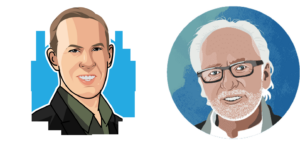
Gregg Vanourek is a writer, teacher, and TEDx speaker on personal development and leadership. He is co-author of three books, including LIFE Entrepreneurs: Ordinary People Creating Extraordinary Lives (a manifesto for living with purpose and passion) and Triple Crown Leadership: Building Excellent, Ethical, and Enduring Organizations (a winner of the International Book Awards). Check out his Best Articles or get his monthly newsletter.
Richard Leider is an internationally best-selling author, coach, and keynote speaker who’s widely viewed as a thought leader of the global purpose movement. His work is featured regularly in many media sources, including PBS and NPR. He is the founder of Inventure—The Purpose Company, a firm created to guide people to live, work, and lead on purpose.
Gregg’s Tools for You
- Traps Test (Common Traps of Living) to help you identify what’s getting in the way of your happiness and quality of life
- Quality of Life Assessment to help you discover your strongest areas and the areas that need work and then act accordingly
- Strengths Search to help you identify your core strengths and determine how to use them more in your life and work
Related Articles & Books
- “How to Discover Your Purpose”
- “The Problem with Not Being Clear About Our Purpose”
- “The Most Common Myths about Purpose”
- “Purpose Demystified”
- “Unlock Your Purpose—3 Key Elements”
- “Unlock the Power of Purpose in Your Work and Leadership“
- “Purposeful Aging–Still Growing and Giving“
- “On Spirituality and the Good Life“
- Richard Leider and David Shapiro, The Power of Purpose: To Grow and to Give for Life (4th edition, Berrett-Koehler, 2025)
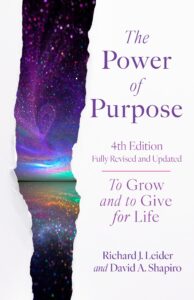
Postscript: Inspirations on Purpose and Spirituality
- “I believe that we are put on this earth to live our soul’s purpose. To me, that means using our unique gifts and talents to make a positive impact in the world and help create the world we want to see…. We are all born with an inner compass that tells us whether or not we’re on the right path to finding our true purpose. That compass is our JOY.” -Jack Canfield, author
- “You have to build meaning into your life, and you build it through your commitments—whether to your religion, to an ethical order as you conceive it, to your life’s work, to loved ones, to your fellow humans.” -John W. Gardner, author and civic activist
- “Everyone has a calling, which is the small, unsettling voice from deep within our souls, an inner urge, which hounds us to live out our purpose in a certain way. A calling is a concern of the spirit. Since a calling implies that someone calls, my belief is that the caller is God.” -Dave Wondra, executive coach
- “I believe there’s a calling for all of us. I know that every human being has value and purpose. The real work of our lives is to become aware. And awakened. To answer the call.” -Oprah Winfrey, teacher, author, and entrepreneur
- “Purpose is the recognition of the presence of the sacred within us and the choice of work that is consistent with that presence. Purpose defines our contribution to life. It may find expression through family, community, relationship, work, and spiritual activities.” -Richard Leider, author
- “As the rain and the snow come down from heaven, and do not return to it without watering the earth and making it bud and flourish, so that it yields seed for the sower and bread for the eater, so is my word that goes out from my mouth: It will not return to me empty, but will accomplish what I desire and achieve the purpose for which I sent it.” -Isaiah 55:10-11 NIV
- Spirituality is “recognizing and celebrating that we are all inextricably connected to each other by a power greater than all of us, and that our connection to that power and to one another is grounded in love and compassion. Practicing spirituality brings a sense of perspective, meaning, and purpose to our lives.” -Brene Brown, The Gifts of Imperfection
- “Earlier in my life, I thought the things that mattered were the things that you could see, like your car, your house, your wealth, your property, your office. But as I’ve grown older I’ve become convinced that the things that matter most are the things that you can’t see–the love you share with others, your inner purpose, your comfort with who you are.” -Jimmy Carter
- “The deepest desire of our hearts is for union with God. God created us for union with himself: This is the original purpose of our lives.” -Brennan Manning, author
- “We have not come into the world to be numbered; we have been created for a purpose; for great things: to love and be loved.” -Mother Teresa of Calcutta
- “The purposes of a man’s heart are deep waters, but a man of understanding draws them out.” -Proverbs 20:5
“God is the one who can tell us the reason for our existence, our place in the scheme of things, our real identity.
It is an identity we can’t discover for ourselves and that others can’t discover for us.
How we have chased around the world for answers to this riddle, looked in the eyes of others for some hint, some clue, hunted in the worlds of pleasure and experience and self-fulfillment for some glimpse, some revelation, some wisdom, some authority to tell us our right name and our true destination.
But there was, and is, only One who can tell us this: The Lord Himself. And he wants to tell us, he has made us to know our reason for being and to be led by it. But it is a secret he will entrust to us only when we ask, and then in His own way and His own time. He will whisper it not in the mad rush and fever of our striving and our fierce determination to become someone, but rather when we are content to put our rest in him, to put ourselves in his keeping, into his hands. Most delightfully of all, it is a secret he will tell us slowly and sweetly, when we are willing to spend time with him.” -Emily Griffin, Clinging






